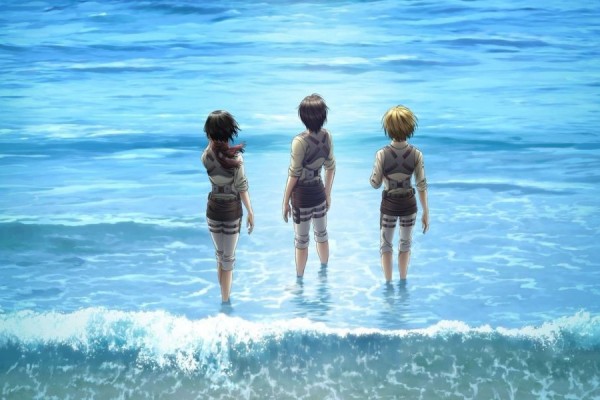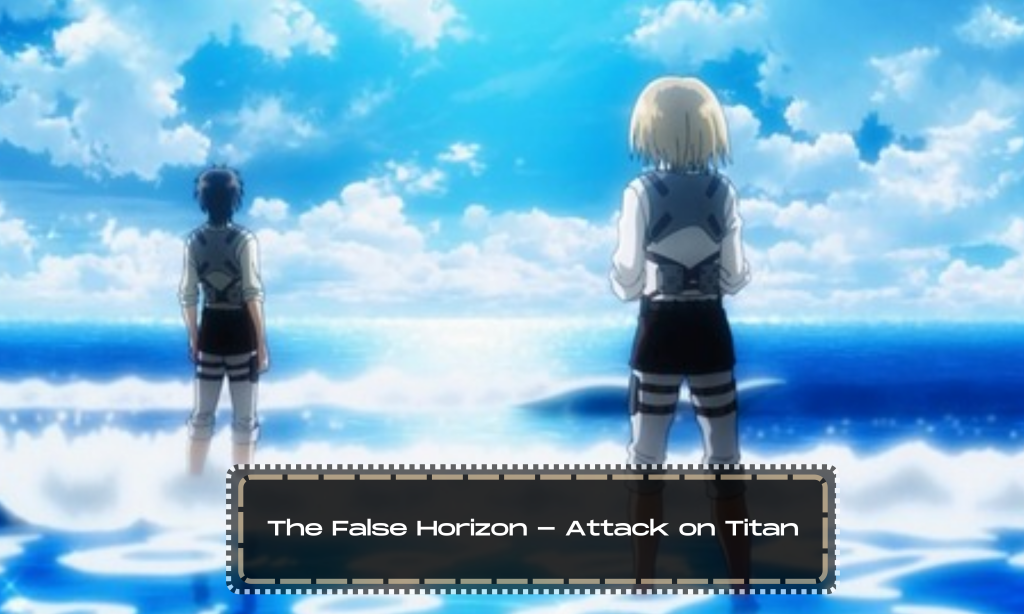The False Horizon – Attack on Titan

There is something of an inherent draw to idealistic unknowns. At difficult spots in our lives, we yearn for the light at the end of the tunnel and place a sometimes disproportionate amount of weight on a hopeful, ambiguous future simply because it is different. It’s safer, it’s new, and it is a place and time other than right here and right now, so the grass always seems greener and the mysteries of the world always seem to hide something wonderful.
This is often the perspective of a child, and in this particular context, oppressed children – Armin Arlert and Eren Yeager – who, having grown up their entire childhoods hiding within walls from the horrors without, dream of the wonders beyond them – namely, the sea. A mythical, vast expanse of seemingly endless water, representing an unexplored world and complete freedom, far from the cage that they find themselves in.
To them, this is awesome and foreign, something to be celebrated and something to strive toward as a life goal. This sense of liberation. And the importance of the sea just grows and grows as the two see their homes destroyed, as they experience grief, grow up as child soldiers and find themselves in a war.
Along with Mikasa and the rest of their comrades, they trudge through the muck, through the very pits of hell itself – not just because all of this is an obstacle in front of them, but because they see something positive for them on the other side. The two I mentioned have a common goal in seeking freedom, but they diverge in the complexion of that goal.
For Eren, he hopes to quench his rage and thirst for revenge through destroying all of the Titans early on, and eventually learns to do what he does out of obligation, and while Armin obviously does do this for humanity as well, the fuel for his actions is simple hope. Revenge, hate and a dark duty can only bring you so far before you burn out and lose all sense of yourself.
Because in this case, even if you achieve your goal, there is no chance for a sense of fulfillment. That’s why the sea is so important. Eren sees light and hope for humanity at the end of this war because Armin does, and the two strive for that horizon because.. they have to. Because to them, the sea represents the idea that at the end of all this fighting, they will be free and at peace.
There has to be something worthwhile at the end of this and there has to be some sort of reason for them to have lived like this. Otherwise, what is the point? Unfortunately for them, they are unwilling participants of an epic, tragic cycle of endless conflict that has been waged for hundreds and hundreds of years.
As the layers of it’s intricate plot are slowly pulled back, Attack on Titan reveals itself to be a story that focuses deeply on the terrors of war, the grey human nuances that come about as a result of oppression, and arguably most importantly – the nature of perspective. Because as revealed by the information left behind by Grisha, the war that is being fought against Titans is only one small part of the truth.
The Titans were not truly the enemy – they were the tools of the enemy, tools of Marley. And Marley itself has people within it just like our protagonists with as much genuine motive and reasoning behind their want to destroy Eldia as Eren or Armin or Levi or Mikasa have for wanting to fight back. What Armin and Eren believed to be their entire world was just an island, and the conflict that consumed their lives was just the tip of the iceberg, with no end in sight.
:quality(75)/cloudfront-us-east-1.images.arcpublishing.com/elcomercio/QUMZ3LMLLNFQRA66KSZMZN6PLY.jpg)
When you’ve fought tooth and nail, sacrificed comrades, lost family and been to the abyss and back to reach some sort of outcome.. you’d expect that outcome to be liberating. You’d expect it to be a reward for your sacrifice. But these people have learnt that it’s just an illusion. That sea holds no wonder anymore – To Eren now, it’s a deceptive expanse of nothing.
It has no meaning. The hopes that Armin described once. They’re gone and lost now, because Eren holds the burden of the truth on his shoulders. He thought that he would reach the water and feel a sense of freedom and wonder and discovery after fighting through the Titans, and he thought that maybe he and his loved ones could carve out a proper life for themselves in this abstract future.
Again, that relatable draw to the idealistic unknown. But now they know exactly what to expect, and the weight of this truth is soul-crushing as these people must wonder to themselves – will there ever be an end to the fighting? And if they put themselves in someone like Reiner’s shoes – can you even place blame upon the majority of those that they are fighting against?
The current warfare is against opposition fighting for their own freedom as the Eldians are, but the conflict dates so far back and branches so far outward that blame becomes a redundant concept. The true adversary here is no Titan, person, or faction – it is war itself and how it can blind people, and its seeds sprouted the minute Ymir Fritz made her deal with the Gods. Appropriately, all it takes is a perspective shift, and what was once wondrous and awesome is now haunting and dishonest.
This sea is not endless. It holds no mysteries. It is finite, and on the other side is a sprawling civilization duty-bound to be their mortal enemy. The real fight begins now. This is not the light at the end of the tunnel as they had once thought – this is just the beginning. They are still so far from being free, and Eren seems to be the only one who realizes the magnitude of this false dawn.

It has always been this way. Because this is war. Because on all sides, there are good people and innocents, there are shades of grey and individuals with sympathetic motivations behind heinous acts, and there are people being oppressed. It isn’t fair – But it doesn’t matter, because that’s what war is. And in this moment, the moment where he finally reaches the sea that he had always dreamt about..
Eren feels all of this – the futility, the pointlessness. It’s a brutal goodbye to innocence. He wonders what he is even doing, if any of this is worth it, perhaps if life is even worth living. And in one of the story’s most gorgeous moments – in an ironic expression of deep grief – he allows himself to be vulnerable in this moment as he sees this sea – before steeling himself for the fight ahead.
Because ingrained in him is a burning desire for survival and victory, a primitive instinct that has carried him through life up until this point. And it sure as hell hasn’t left him because of these revelations. He resolves to transform that once desperate, distant hope attached to his unyielding rage into something more pragmatic, something that will bring about a prosperous future in the true world.
He will use the agonizing pain of this false horizon as fuel to empower him to do what needs to be done in the coming war – because nothing less than evil will be capable of ending the evil of this cycle of misery. Many thanks for reading.
That’s me, Andreea Blaga, author of the blog anime-everything.com. I work as a content creator in the US. I am also passionate about Japanese Anime.


Related post
The Art Style of Solo Leveling: A Visual Feast for Readers
On this pageThe False Horizon – Attack on TitanThe Art Style of Solo Leveling: A...
Oct
Why JJBA is the Most Bizarre Anime Ever Made
When discussing iconic anime series, one title that consistently stands out is “JoJo’s Bizarre Adventure,”...
Oct
The Impact of Wind Breaker on the Sports Anime Genre
The sports anime genre has seen numerous iterations over the years, captivating audiences with its...
Sep
Decoding the Enigmas: Exploring the Hidden Secrets of Gravity Falls
“Gravity Falls,” created by Alex Hirsch, is a beloved animated series that has captivated audiences...
Aug
The Rise of Kaiju No. 8: A New Era of Monster Manga
The world of manga has always been rife with innovative storytelling and vivid illustrations, but...
Aug
Character Study: Korra and Aang’s Legacy
In the richly woven tapestry of the “Avatar” universe, the characters of Korra and Aang...
Jul